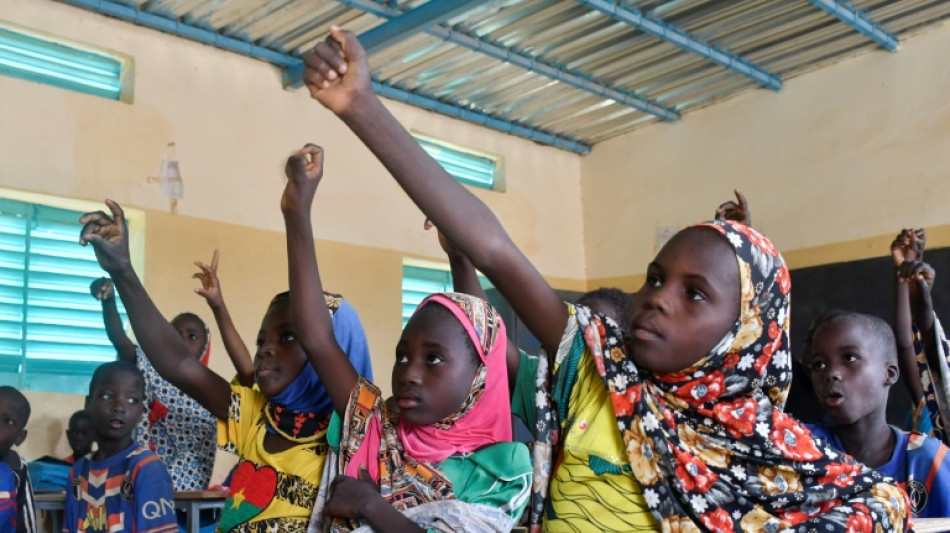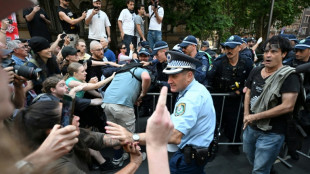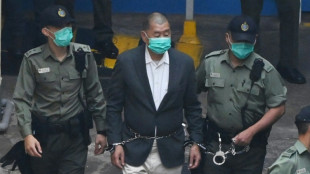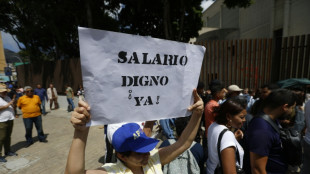
-
 Music world mourns Ghana's Ebo Taylor, founding father of highlife
Music world mourns Ghana's Ebo Taylor, founding father of highlife
-
HK mogul's ex-workers 'broke down in tears' as they watched sentencing

-
 JD Vance set for Armenia, Azerbaijan trip
JD Vance set for Armenia, Azerbaijan trip
-
Sydney police deploy pepper spray as Israeli president's visit sparks protests

-
 EU warns Meta it must open up WhatsApp to rival AI chatbots
EU warns Meta it must open up WhatsApp to rival AI chatbots
-
Scotland spoil Italy's T20 World Cup debut with big win

-
 Stocks track Wall St rally as Tokyo hits record on Takaichi win
Stocks track Wall St rally as Tokyo hits record on Takaichi win
-
Israeli president says 'we will overcome evil' at Bondi Beach

-
 Munsey leads Scotland to 207-4 against Italy at T20 World Cup
Munsey leads Scotland to 207-4 against Italy at T20 World Cup
-
Venezuela's Machado says ally 'kidnapped' after his release

-
 Japan restarts world's biggest nuclear plant again
Japan restarts world's biggest nuclear plant again
-
Bangladesh poll rivals rally on final day of campaign

-
 Third impeachment case filed against Philippine VP Duterte
Third impeachment case filed against Philippine VP Duterte
-
Wallaby winger Nawaqanitawase heads to Japan

-
 Thailand's Anutin rides wave of nationalism to election victory
Thailand's Anutin rides wave of nationalism to election victory
-
Venezuela's Machado says ally kidnapped by armed men after his release

-
 Maye longs for do-over as record Super Bowl bid ends in misery
Maye longs for do-over as record Super Bowl bid ends in misery
-
Seahawks' Walker rushes to Super Bowl MVP honors

-
 Darnold basks in 'special journey' to Super Bowl glory
Darnold basks in 'special journey' to Super Bowl glory
-
Japan's Takaichi may struggle to soothe voters and markets

-
 Bad Bunny celebrates Puerto Rico at Super Bowl, angering Trump
Bad Bunny celebrates Puerto Rico at Super Bowl, angering Trump
-
Seahawks soar to Super Bowl win over Patriots

-
 'Want to go home': Indonesian crew abandoned off Africa demand wages
'Want to go home': Indonesian crew abandoned off Africa demand wages
-
Asian stocks track Wall St rally as Tokyo hits record on Takaichi win

-
 Hong Kong sentences pro-democracy mogul Jimmy Lai to 20 years in jail
Hong Kong sentences pro-democracy mogul Jimmy Lai to 20 years in jail
-
Bad Bunny celebrates Puerto Rico in joyous Super Bowl halftime show

-
 Three prominent opposition figures released in Venezuela
Three prominent opposition figures released in Venezuela
-
Japan PM Takaichi basks in historic election triumph

-
 Israeli president says 'we shall overcome this evil' at Bondi Beach
Israeli president says 'we shall overcome this evil' at Bondi Beach
-
'Flood' of disinformation ahead of Bangladesh election

-
 Arguments to begin in key US social media addiction trial
Arguments to begin in key US social media addiction trial
-
Gotterup tops Matsuyama in playoff to win Phoenix Open

-
 New Zealand's Christchurch mosque killer appeals conviction
New Zealand's Christchurch mosque killer appeals conviction
-
Leonard's 41 leads Clippers over T-Wolves, Knicks cruise

-
 Patriots-Seahawks Super Bowl approaches as politics swirl
Patriots-Seahawks Super Bowl approaches as politics swirl
-
Trump says China's Xi to visit US 'toward the end of the year'

-
 Real Madrid edge Valencia to stay on Barca's tail, Atletico slump
Real Madrid edge Valencia to stay on Barca's tail, Atletico slump
-
Malinin keeps USA golden in Olympic figure skating team event

-
 Lebanon building collapse toll rises to 9: civil defence
Lebanon building collapse toll rises to 9: civil defence
-
Real Madrid keep pressure on Barca with tight win at Valencia

-
 Dimarco helps Inter to eight-point lead in Serie A, Juve stumble
Dimarco helps Inter to eight-point lead in Serie A, Juve stumble
-
PSG trounce Marseille to move back top of Ligue 1

-
 Two prominent opposition figures released in Venezuela
Two prominent opposition figures released in Venezuela
-
Hong Kong to sentence media mogul Jimmy Lai in national security trial

-
 Lillard will try to match record with third NBA 3-Point title
Lillard will try to match record with third NBA 3-Point title
-
Vonn breaks leg as crashes out in brutal end to Olympic dream

-
 Malinin enters the fray as Japan lead USA in Olympics team skating
Malinin enters the fray as Japan lead USA in Olympics team skating
-
Thailand's Anutin readies for coalition talks after election win

-
 Fans arrive for Patriots-Seahawks Super Bowl as politics swirl
Fans arrive for Patriots-Seahawks Super Bowl as politics swirl
-
'Send Help' repeats as N.America box office champ


Fleeing jihadist violence, Niger pupils return to school
With blue schoolbags bouncing off their backs, hundreds of schoolchildren hurtle down small sand dunes eager to attend class again.
But these boys and girls are survivors of suffering and trauma that few children of their age could conceive.
Their new school is in the town of Ouallam in southwestern Niger, a region that for five years has been plagued by attacks unleashed by groups linked with Al-Qaeda and the Islamic State group.
The pupils come from 18 villages near Mali whose inhabitants fled to the relative safety of Ouallam in 2021 after jihadist killings that also forced the closure of schools.
The UN children's agency UNICEF says 817 schools with 72,421 pupils -- including 34,464 girls -- have closed in Niger, mostly in the Tillaberi, the border region where Ouallam is located.
In Ouallam alone, around one hundred schools have had to shut their doors.
The chronic insecurity has prompted the authorities to create dedicated educational centres where displaced children can resume their schooling, Mahamadou Illo Abarchi, an education official in Ouallam, told AFP.
Some 17,000 pupils have already re-entered the school system and another 55,300 are set to follow suit, enrolling in around 20 centres for displaced children across southwestern Niger, the government says.
- 'Killed by the bandits' -
In Ouallam, almost 1,600 schoolchildren -- some of whom had not attended class for three years -- are registered with three centres built near a site for displaced people.
The sites offer free canteens, a vital resource for families who have escaped violence in a nation that, by the UN's human development index, is the poorest in the world.
Lessons take place in shelters or classrooms equipped with tables and benches provided by NGOs. But in others, the pupils must learn on the floor.
Fatima and Aissa, two young girls from Ngaba, a settlement near Mali, expressed their delight at returning to school as they clutched their slate boards.
But the euphoria of returning to school cannot wipe out the painful memories.
"My uncle was a village chief, he was killed by the bandits in front of our eyes," said Mariama, who also lived in Ngaba. "There was a lot of blood."
Nassirou, Malick, Hasane, Abdou and their parents fled their village of Adabdab on foot after a series of jihadist attacks, the last of which on October 22 claimed the lives of 11 civilians.
"It was the bandits who chased us away, they killed many men," Nassirou said quietly in the playground.
Moussa, who hails from a hamlet in the same area, said: "I'm not afraid anymore, I no longer hide when I hear the sound of motorcycles" often used by jihadists to attack villages.
- 'Encouraging results' -
When they first arrived at the new centres, many children showed "signs of distress and trauma, others were very aggressive", said education official Morou Chaibou.
He spoke of how some pupils recounted harrowing memories -- including seeing their parents being shot.
Adamou Dari, the regional director of the centres, said they also offered the children psychological and social support to give them some stability after their traumatic experience.
"Now they concentrate in class and the results are encouraging," said a teacher as she played in the courtyard with some of her pupils.
Absenteeism is minor but a source of worry, Dari said, explaining that some pupils played truant to work in the town and feed their families.
Harlem Desir of the International Rescue Committee, who recently visited the site for displaced people in Ouallam, said impoverished families often put their children to work or marry their daughters at a young age.
In 2021, Amnesty International warned that boys aged between 15 and 17 were filling the ranks of armed groups, especially the Al-Qaeda-affiliated GSIM, in the Torodi region near Burkina Faso -- with the blessing of their parents.
Y.AlMasri--SF-PST




